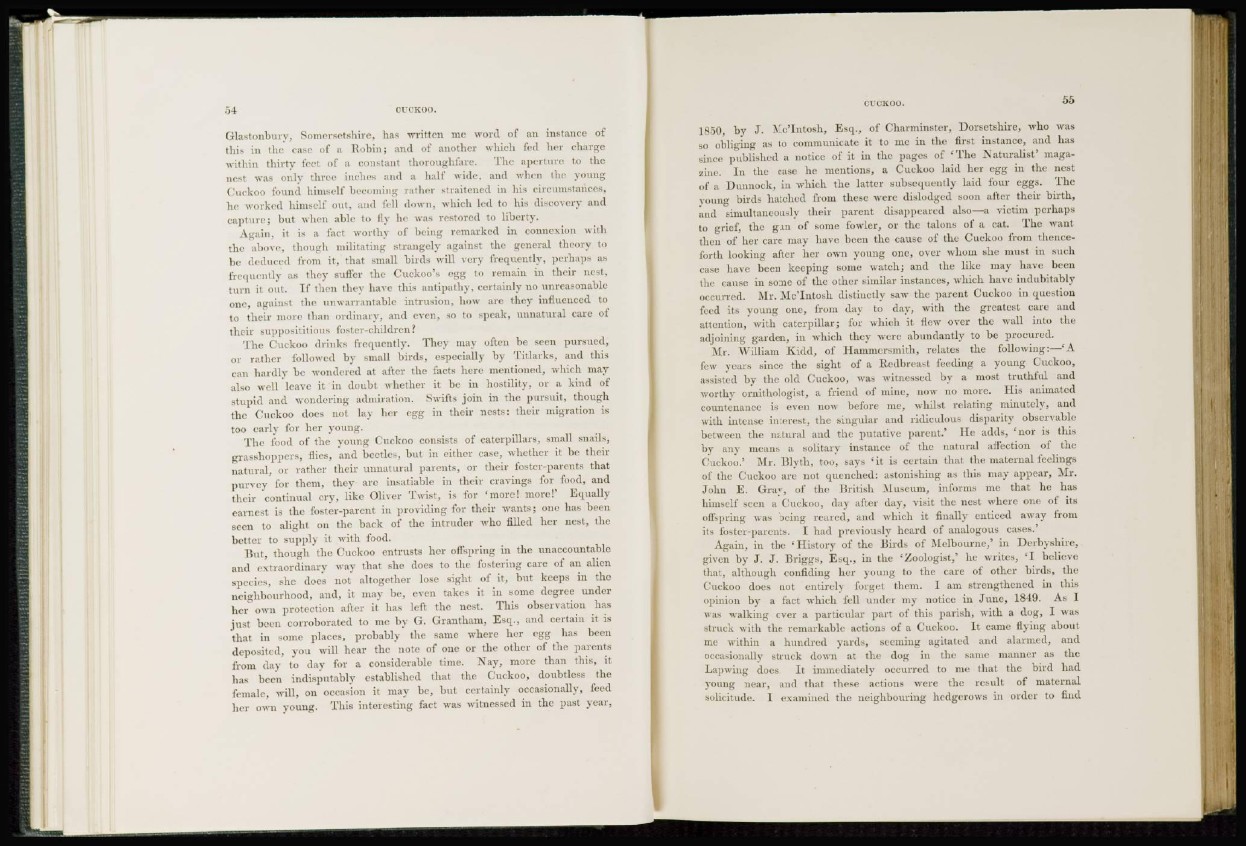
54 crc-Koo.
Glastonbury, Somersetshire, has written me word of an instance of
this i n the case of a Robin; and of another which fed her charge
within thirty feet of a constant thoroughfare. The aperture to the
nest was only three inches and a half wide, and when the young
Cuckoo found himself becoming rather straitened in his circumstances,
he worked himself out, and fell down, which led to his discovery and
capture; but when able to fly he was restored to liberty.
Again, it is a fact worthy of being remarked in connexion with
the above, though militating strangely against the general theory to
be deduced from it, that small birds will very frequently, perhaps as
frequently as they suffer the Cuckoo's egg to remain in their nest,
turn it out. If then they have this antipathy, certainly no unreasonable
one, against the unwarrantable intrusion, how are they influenced to
to their more than ordinary, and even, so to speak, unnatural care of
their supposititious foster-children?
'The Cuckoo drinks frequently. They may often he seen pursued,
or rather followed by small birds, especially by Titlarks, and this
can hardly be wondered at after the facts here mentioned, which may
also well leave it in doubt whether it be in hostility, or a kind of
stupid and wondering admiration. Swifts join in the pursuit, though
the Cuckoo does not lay her egg in their nests: their migration is
too early for her young.
The food of the young Cuckoo consists of caterpillars, small snails,
grasshoppers, flies, and beetles, but in either case, whether it be their
natural, or rather their unnatural parents, or their foster-parents that
purvey for them, they arc insatiable in their cravings for food, and
their continual cry, like Oliver Twist, is for 'more! more!' Equally
earnest is the foster-parent in providing for their wants; one has been
seen to alight on the back of the intruder who filled her nest, the
better to supply it with food.
But, though the Cuckoo entrusts her offspring in the unaccountable
and extraordinary way that she does to the fostering care of an alien
species, she does not altogether lose sight of it, but keeps in the
neighbourhood, and, it may be, even takes it in some degree under
her own protection after it has left the nest. This observation has
just been corroborated to me by G. Grantham, Esq., and certain it is
that in some places, probably the same where her egg has been
deposited, you will hear the note of one or the other of the parents
from day to day for a considerable time. Nay, more than this, it
has been indisputably established that the Cuckoo, doubtless the
female, will, on occasion it may be, but certainly occasionally, feed
her own young. This interesting fact was witnessed in the past year,
1850, by J. Mc'Intosh, Esq., of Charminster, Dorsetshire, who was
so obliging as to communicate it to me in the first instance, and has
since published a notice of it in the pages of 'The Naturalist' magazine.
In the case he mentions, a Cuckoo laid her egg in the nest
of a Dunnock, in which the latter subsequently laid four eggs. The
young birds hatched from these were dislodged soon after their birth,
and simultaneously their parent disappeared also—a victim perhaps
to grief, the gun of some fowler, or the talons of a cat. The want
then of her care may have been the cause of the Cuckoo from thenceforth
looking after her own young one, over whom she must in such
case have been keeping some watch; and the like may have been
the cause in some of the other similar instances, which have indubitably
occurred. Mr. Mc'Intosh distinctly saw the parent Cuckoo in question
feed its young one, from day to day, with the greatest care and
attention, with caterpillar; for which it flew over the wall into the
adjoining garden, m which they were abundantly to be procured.
Mr. William Kidd, of Hammersmith, relates the following:—'A
few years since the sight of a Redbreast feeding a young Cuckoo,
assisted by the old Cuckoo, was witnessed by a most truthful and
worthy ornithologist, a friend of mine, now no more. His animated
countenance is even now before mc, whilst relating minutely, and
with intense interest, the singular and ridiculous disparity observable
between the natural and the putative parent.9 He adds, 'nor is this
by any means a solitary instance of the natural affection of the
Cuckoo.' Mr. Blyth, too, says 'it is certain that the maternal feelings
of the Cuckoo are not quenched: astonishing as this may appear, Mr.
John E. Gray, of the British Museum, informs me that he has
himself seen a Cuckoo, day after day, visit the nest where one of its
ofispring was being reared, and which it finally enticed away from
its foster-parents. I had previously heard of analogous cases,'
Again, in the 'History of the Birds of Melbourne,* in Derbyshire,
given by J. J. Briggs, Esq_., in the 'Zoologist,' he writes, ' I believe
that, although confiding her young to the care of other birds, the
Cuckoo does not entirely forget them. I am strengthened in this
opinion by a fact which fell under my notice in June, 1849. As I
was walking over a particular part of this parish, with a dog, I was
struck with the remarkable actions of a Cuckoo. It came flying about
mc within a hundred yards, seeming agitated and alarmed, and
occasionally struck down at the dog in the same manner as the
Lapwing does. It immediately occurred to me that the bird had
young near, and that these actions were the result of maternal
solicitude. 1 examined the neighbouring hedgerows in order to find